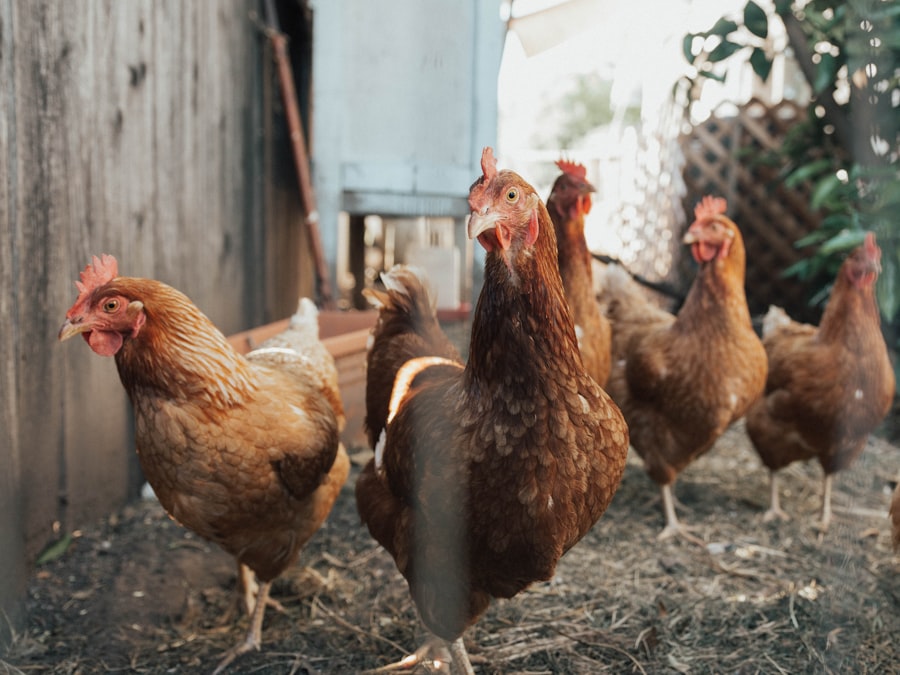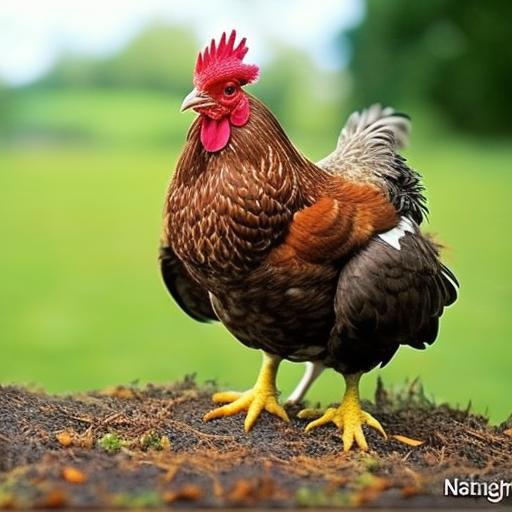Keeping chickens as pets has become increasingly popular in recent years, as more people are discovering the joys of having these feathered friends in their backyard. Not only do chickens provide fresh eggs, but they also offer pest control and companionship. In this article, we will explore the benefits of keeping chickens as pets, factors to consider before choosing a chicken breed, the top 5 chicken breeds for pet keeping, characteristics and temperament of each breed, feeding and caring for your pet chickens, building the perfect chicken coop, essential features of a chicken coop, maintaining cleanliness and hygiene in your chicken coop, and finally, enjoying the rewards of raising chickens as pets.
Key Takeaways
- Keeping chickens as pets has numerous benefits, including fresh eggs, pest control, and companionship.
- Before choosing a chicken breed, consider factors such as climate, space, and temperament.
- The top 5 chicken breeds for pet keeping are Rhode Island Red, Plymouth Rock, Sussex, Orpington, and Wyandotte.
- Each breed has unique characteristics and temperament, such as the Rhode Island Red’s hardiness and the Orpington’s docility.
- Feeding and caring for your pet chickens involves providing a balanced diet, clean water, and regular health checks.
Benefits of Keeping Chickens as Pets
One of the main benefits of keeping chickens as pets is the abundance of fresh eggs they provide. There is nothing quite like collecting eggs from your own backyard and knowing exactly where they came from. Not only are fresh eggs delicious, but they are also more nutritious than store-bought eggs. Chickens that are allowed to roam freely and eat a varied diet produce eggs that are higher in omega-3 fatty acids and vitamins A and E.
Another benefit of having chickens as pets is their natural pest control abilities. Chickens love to forage for insects and other pests in your yard, helping to keep your garden free from unwanted critters. They will happily eat slugs, snails, ticks, and even small rodents. This can save you money on pest control products and help create a more balanced ecosystem in your backyard.
Companionship is another wonderful aspect of keeping chickens as pets. Chickens are surprisingly social animals and can form strong bonds with their human caretakers. They enjoy being around people and will often follow you around the yard or sit on your lap if given the opportunity. Many chicken owners find that spending time with their feathered friends is a great way to relax and de-stress.
Factors to Consider Before Choosing a Chicken Breed
Before bringing chickens into your life, it is important to consider the breed that will best suit your lifestyle and needs. There are many factors to take into account, such as egg-laying ability, temperament, and climate adaptability.
If you are primarily interested in fresh eggs, then choosing a breed known for its egg-laying abilities is essential. Some breeds, such as the Rhode Island Red or the Leghorn, are prolific layers and can provide you with a steady supply of eggs throughout the year. On the other hand, if you are more interested in chickens as pets and don’t necessarily need a large number of eggs, then you may want to consider breeds that are known for their friendly and docile temperament.
Climate adaptability is another important factor to consider when choosing a chicken breed. Some breeds are better suited to colder climates, while others thrive in warmer environments. It is important to choose a breed that can withstand the temperatures and weather conditions in your area to ensure the health and well-being of your chickens.
Top 5 Chicken Breeds for Pet Keeping
There are many different chicken breeds to choose from, each with its own unique characteristics and temperament. However, some breeds have become particularly popular for backyard pet keeping due to their suitability for small environments and their friendly nature. Here are the top 5 chicken breeds for pet keeping:
1. Rhode Island Red: The Rhode Island Red is a classic backyard chicken breed known for its excellent egg-laying abilities. They are also known for their friendly and docile temperament, making them great pets for families with children.
2. Australorp: The Australorp is another breed that is highly regarded for its egg-laying abilities. They are also known for being calm and friendly, making them a popular choice for backyard pet keeping.
3. Orpington: Orpingtons are large, fluffy chickens that come in a variety of colors. They are known for their gentle and friendly nature, making them great pets for families. While they may not lay as many eggs as some other breeds, their sweet temperament more than makes up for it.
4. Silkie: Silkies are small, fluffy chickens with a unique appearance. They have soft, silky feathers and are known for their friendly and docile nature. Silkies are great pets for children and can be easily handled and cuddled.
5. Wyandotte: Wyandottes are a beautiful breed of chicken that come in a variety of colors and patterns. They are known for their friendly and calm temperament, making them great pets for families. They are also good layers, providing a steady supply of eggs.
Characteristics and Temperament of Each Breed
The Rhode Island Red is a medium-sized chicken with beautiful reddish-brown feathers. They are known for their excellent egg-laying abilities, producing large brown eggs consistently throughout the year. Rhode Island Reds are also known for their friendly and docile temperament, making them great pets for families with children. They are easy to handle and enjoy being around people.
Australorps are medium-sized chickens with shiny black feathers. They are excellent layers, producing large brown eggs consistently throughout the year. Australorps are known for their calm and friendly nature, making them great pets for families. They are easy to handle and enjoy being around people.
Orpingtons are large, fluffy chickens that come in a variety of colors, including black, blue, buff, and white. They are known for their gentle and friendly nature, making them great pets for families. While they may not lay as many eggs as some other breeds, their sweet temperament more than makes up for it.
Silkies are small chickens with soft, silky feathers that come in a variety of colors, including black, blue, buff, and white. They are known for their friendly and docile nature, making them great pets for children. Silkies are easily handled and enjoy being cuddled.
Wyandottes are a beautiful breed of chicken that come in a variety of colors and patterns, including silver laced, gold laced, and blue laced red. They are known for their friendly and calm temperament, making them great pets for families. Wyandottes are also good layers, providing a steady supply of eggs.
Feeding and Caring for Your Pet Chickens

Feeding and caring for your pet chickens is relatively easy, but it is important to provide them with a balanced diet and proper care to ensure their health and well-being. Chickens require a diet that is high in protein, vitamins, and minerals to support their growth and egg production.
A good quality chicken feed should be the main component of your chickens’ diet. Look for a feed that is specifically formulated for laying hens, as this will provide them with the necessary nutrients they need to produce healthy eggs. You can also supplement their diet with kitchen scraps, such as fruits and vegetables, as well as treats like mealworms or sunflower seeds.
Fresh water should always be available to your chickens. Make sure to clean their water containers regularly to prevent the growth of bacteria or algae. Chickens also enjoy scratching and pecking at the ground, so providing them with access to a grassy area or a dirt patch can help keep them entertained and stimulated.
Building the Perfect Chicken Coop
A well-designed chicken coop is essential for the health and happiness of your chickens. It provides them with a safe and secure environment to live in, as well as protection from predators and the elements. While there are many pre-made chicken coops available on the market, building your own coop can be a rewarding experience and allows you to customize it to suit your specific needs.
When designing your chicken coop, it is important to consider the size and number of chickens you plan to keep. Chickens need enough space to move around comfortably and stretch their wings. As a general rule of thumb, allow at least 4 square feet of space per chicken inside the coop and 10 square feet per chicken in the outdoor run.
The coop should also have good ventilation to prevent the buildup of moisture and ammonia from chicken droppings. This can be achieved by adding windows or vents that can be opened and closed as needed. Adequate ventilation helps to keep the air inside the coop fresh and reduces the risk of respiratory problems in your chickens.
Essential Features of a Chicken Coop
There are several essential features that every chicken coop should have to ensure the health and well-being of your chickens. These include:
1. Nesting boxes: Chickens need a quiet and private place to lay their eggs. Provide them with nesting boxes filled with clean straw or shavings where they can lay their eggs comfortably.
2. Roosting bars: Chickens naturally roost at night, so it is important to provide them with roosting bars where they can perch and sleep. The bars should be at least 2 inches wide and positioned higher than the nesting boxes.
3. Secure fencing: A secure fence is essential to keep your chickens safe from predators. Make sure the fence is buried at least 6 inches into the ground to prevent predators from digging under it.
4. Easy access for cleaning: Cleaning your chicken coop regularly is important for maintaining cleanliness and hygiene. Make sure the coop has easy access for cleaning, such as removable trays or doors that open wide.
5. Adequate lighting: Chickens need natural light to lay eggs consistently. Make sure the coop has windows or skylights that allow plenty of natural light to enter.
Maintaining Cleanliness and Hygiene in Your Chicken Coop
Maintaining a clean and hygienic chicken coop is essential for the health and well-being of your chickens. A dirty coop can lead to the buildup of bacteria and parasites, which can cause diseases and health problems in your chickens. Here are some tips for cleaning and disinfecting your coop:
1. Remove droppings regularly: Chicken droppings should be removed from the coop on a regular basis to prevent the buildup of ammonia and bacteria. Use a shovel or rake to scoop up the droppings and dispose of them in a compost bin or garden.
2. Clean and disinfect regularly: Clean the coop thoroughly at least once a month to remove any dirt, dust, or debris. Use a mild detergent or poultry-safe disinfectant to clean all surfaces, including nesting boxes, roosting bars, and flooring.
3. Replace bedding regularly: Bedding should be replaced regularly to keep the coop clean and fresh. Remove any soiled or wet bedding and replace it with clean straw or shavings.
4. Provide dust baths: Chickens naturally take dust baths to keep their feathers clean and free from parasites. Provide them with a designated area filled with sand or fine dirt where they can take their dust baths.
5. Practice biosecurity: Biosecurity measures can help prevent the spread of diseases in your flock. This includes quarantining new chickens before introducing them to your existing flock, washing your hands before and after handling chickens, and preventing wild birds or rodents from entering the coop.
Enjoying the Rewards of Raising Chickens as Pets
Keeping chickens as pets can be a rewarding experience that provides you with fresh eggs, pest control, and companionship. By choosing the right breed for your lifestyle and needs, providing a suitable environment, and taking proper care of your chickens, you can enjoy all the benefits that come with raising these feathered friends. Whether you are a beginner or an experienced chicken owner, there is always something new to learn and discover about these fascinating creatures. So why not consider raising chickens as pets and share your own experiences in the comments?
If you’re considering keeping chickens as pets, it’s important to choose the right breed that suits your needs and preferences. Poultry Wizard has a helpful article on the best type of chickens to keep as pets, which can be found here. This article provides valuable insights into various chicken breeds, their temperaments, egg-laying capabilities, and overall suitability for backyard pet keeping. Whether you’re looking for friendly and docile chickens or ones that lay a high number of eggs, this article will guide you in making an informed decision.
FAQs
What are the best types of chickens to keep as pets?
There are several breeds of chickens that make great pets, including the Rhode Island Red, Plymouth Rock, Sussex, Orpington, and Silkie.
What makes these breeds good for pets?
These breeds are known for their friendly and docile personalities, making them great for families with children. They are also easy to care for and can adapt well to different living environments.
Do these breeds lay eggs?
Yes, all of these breeds are known for their egg-laying abilities. Some, like the Rhode Island Red and Plymouth Rock, are especially prolific layers.
Do these breeds require a lot of space?
While chickens do need some space to move around, these breeds are relatively small and can do well in smaller coops or backyard environments. However, it’s important to make sure they have enough space to move around comfortably.
What kind of care do these breeds require?
Chickens require daily care, including feeding, watering, and cleaning their living space. They also need regular health check-ups and may require occasional veterinary care.
Can these breeds be kept with other animals?
Chickens can be kept with other animals, but it’s important to introduce them slowly and carefully. Dogs and cats may see chickens as prey, so it’s important to supervise them closely. Chickens can also be kept with other birds, such as ducks or turkeys.
Meet Walter, the feathered-friend fanatic of Florida! Nestled in the sunshine state, Walter struts through life with his feathered companions, clucking his way to happiness. With a coop that’s fancier than a five-star hotel, he’s the Don Juan of the chicken world. When he’s not teaching his hens to do the cha-cha, you’ll find him in a heated debate with his prized rooster, Sir Clucks-a-Lot. Walter’s poultry passion is no yolk; he’s the sunny-side-up guy you never knew you needed in your flock of friends!







